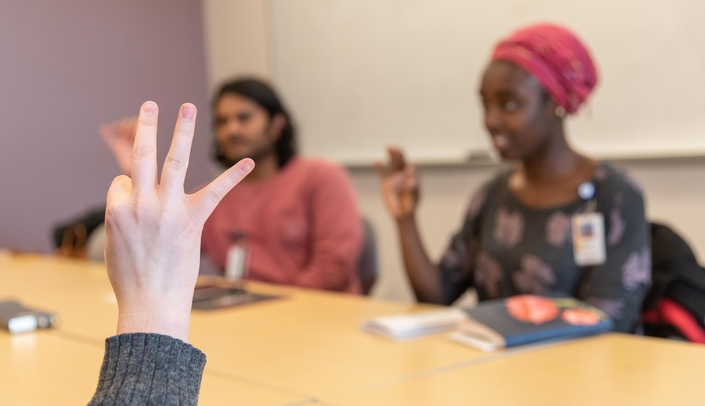When Shaker Dukkipati tried to discuss curriculum goals for an eight-week workshop series, aimed at UNMC students and geared toward working with the deaf and hard-of-hearing community, one of his collaborators didn’t understand him.
“She later told me that she had to learn to adapt to the speed at which I spoke,” Dukkipati said. “That’s something I’d never even thought of.”
Building that awareness — learning to be more cognizant of what needs to be done to facilitate effective conversation — is part of the “Deaf Culture, Accessibility and Language Workshop,” an eight-week workshop series geared toward teaching students how to work effectively with the deaf and hard-of-hearing community.
Dukkipati is the president of the Student Alliance for People of All Abilities (SAPA), a UNMC student group formed in 2018 with the goal of raising awareness of the health care needs of people with disabilities and increasing the quality of care for them. SAPA has worked in the past with the Munroe-Meyer Institute.
Ronda Rankin, a nationally certified health care sign language interpreter, who provides interpreting at UNMC, developed the curriculum for the workshop. She presents the curriculum with April Kammerer, a registered nurse and member of the deaf/hard-of-hearing community. Medical student Henry Mishek was the lead for SAPA in planning and fundraising for the workshop series.
“The energy and motivation is so much more than I expected,” Rankin said. “We strongly encourage new participants, even if they did not attend the first couple of workshops. We have breakout sessions to get them up to speed.”
Rankin also has enlisted student volunteers from UNO’s interpreting training program, where she is a practicum supervisor, to help with the language instruction.
“They have been an important part of the success of the workshop,” she said. “It has allowed us to break up into smaller groups during language instruction. I am truly grateful for them, and it’s been a powerful collaboration between the two schools.”
Rankin said the workshop has three important facets:
- Exposing future health care practitioners to deaf culture and the local deaf community;
- An authentic discussion regarding the barriers this community faces when accessing health care and how these barriers can negatively affect health outcomes; and
- Teaching basic sign language in order to help develop patient/practitioner trust.
“All three are important for cultural competency,” Rankin said.
Kammerer said that as a member of the deaf and hard-of-hearing community, she has often had to fight for access to communication, equal access for job opportunities and education.
She described it as spending a long time swinging a sledgehammer at a brick wall, only to find another wall behind it when it finally falls.
“It is extremely exhausting and frustrating to have to keep fighting for something that so many people take advantage of everyday,” she said.
Many of these challenges, she said, stem from a lack of understanding of deaf culture and language, as well as accessibility issues and the protections afforded by the Americans with Disabilities Act, among the wider community.
The workshops’ curriculum, Dukkipatti said, “is geared toward teaching our students not only the basics of ASL within a health care setting — which is very useful for everyone, to learn how to engage in a situation where an interpreter may not be available — but also, to begin to understand deaf culture. There are a lot of nuances within deaf culture that I wasn’t aware of, and that our students haven’t had any exposure to.
“We’re not just learning ASL,” he said. “The cultural piece, the accessibility aspect, it’s all important.”
The workshop draws between 20-25 students for each session. Students who have not previously attended a session are encouraged to visit the next sessions, from 10 a.m. to noon on March 22, April 18 and May 2 in Room 2010 at the Sorrell Center on the UNMC Omaha Campus.
“Our goal at SAPA is to serve as advocates and facilitators of education, and to be involved in efforts that promote awareness and mixing of ideas,” Dukkipati said. “This is an area that is very important for health care professionals across campus, something that will be very useful for students.
“We have had such a huge interest in the workshop,” Rankin said. “It makes me hopeful that these future health care professionals will go out into the world into their various disciplines and share what they have learned. This is how change starts!”
Kammerer agreed.
“I love that the students are fascinated by the deaf culture, its language and its community,” she said. “I especially love how the students bring their colleagues with them every time they come to workshop. The workshop grows every month, which means that the word is getting out and they are being exposed to the deaf culture. This will be critical to them as they advance into their health care careers — the deaf community is not a small community, and sometimes during their practice they will encounter at least one deaf or hard-of-hearing individual.
“I also enjoy the new challenges that come with the workshop, because this gets Ronda and I thinking on how to keep the current students engaged but also how help the newer student become comfortable with the workshop,” she said.
Kammerer is especially looking forward to the May 2 session, where students will go out into the deaf community, meeting members of the community and practice sign language skills with them.
“The point of the workshop is to get people exposed to the deaf community, how to provide accessibility, and give them a better look of what the deaf culture looks like.”

Great job, Shaker! 🙂